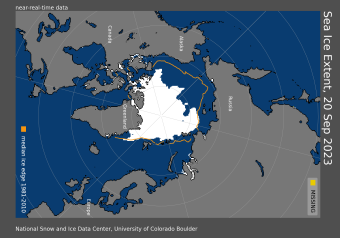- NOC scientists have contributed to a new report published in the UK Marine Climate Change Impacts Partnership (MCCIP)
- The report shows the extent and thickness of Arctic Sea ice continues to decrease in every month of the year, especially in late summer to early autumn
- This loss is not irreversible and Arctic summer sea ice should recover if Arctic temperatures reduce
- By providing evidence to policy makers, we’re supporting our strategic goal to translate research into action and positive change
Scientists from the National Oceanography Centre (NOC) have contributed to the latest report published in the UK Marine Climate Change Impacts Partnership (MCCIP).
The report, led by the Met Office, highlights the rapid warming and decline of sea ice in the Arctic, an area that plays a key role in Earth’s climate system. It shows that over the satellite period 1979–2022, the September sea ice extent has reduced by about 79,000km2 per year on average.
According to the report, it is virtually certain that Arctic sea ice will continue to decline in response to global warming – half of which is attributed to greenhouse gas emissions created by humans. It is likely that the Arctic will become practically ice-free at the seasonal minimum at least once before 2050, regardless of the levels of emissions released in the future. Scientists say this loss is not irreversible however, and Arctic summer sea ice could recover if Arctic temperatures reduce.
The fast Arctic warming reduces the temperature gradient to lower latitudes, which can potentially affect the course of the jet stream and, in turn, the weather in northwest Europe. However, the size of this potential effect is unknown. It is also not clear to what extent the observed changes in the jet stream are related to Arctic climate change or other factors such as internal variability.
Another way, in which the rapidly changing Arctic could affect lower latitudes, occurs through freshwater outflows into the North Atlantic. These freshwater outflows could change the ocean circulation and sea surface temperature in the subpolar North Atlantic. This would have implications for the large-scale atmospheric circulation and weather events. Current research activities at the NOC are investigating these potential risks.
Furthermore, the reduction in sea ice cover is expected to shift the base of primary production towards an increasing dominance of phytoplankton over ice algae, with uncertain consequences for the health of marine life and ecosystems.
MCCIP provides a co-ordinating framework for the UK, delivering high quality evidence on marine climate change impacts, and guidance on adaptation advice, to policy advisors and decision-makers.

